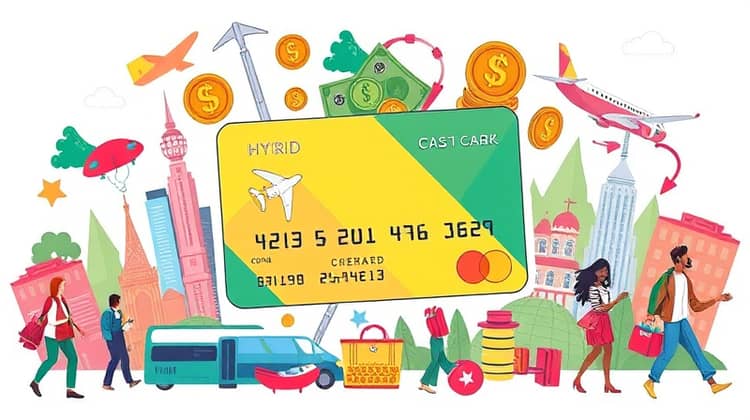Credit Card Rewards Showdown: Are Points Better Than Cashback?

Credit card rewards can significantly enhance your financial experiences, from the way you shop to how you travel. As consumers become more aware of these benefits, they face a crucial decision: should I choose a credit card that offers points or one that provides cashback? Understanding the nuances of these two systems can help you optimize your card usage and maximize your rewards.
Both points and cashback rewards serve the purpose of incentivizing customers to choose particular credit cards. However, they operate on fundamentally different principles and can cater to varied consumer preferences. The goal of this article is to dissect each form of reward system, examine their strengths and weaknesses, and help you decide which option aligns better with your spending habits and financial goals.
Understanding Credit Card Rewards

Credit card rewards encompass a variety of incentive programs offered by financial institutions to entice consumers into using their credit cards for purchases. These rewards can take the form of points, cashback, travel benefits, or merchandise discounts. Grasping the fundamentals of these systems is essential for any consumer who aims to leverage credit cards actively and wisely.
As the market has evolved, so has the complexity of rewards systems. Consumers are now presented with an array of options, each tailored to different spending habits—from frequent travelers to everyday shoppers. Understanding the core differences between points and cashback rewards is the first step to unlocking the full potential of your credit card.
Cashback Rewards

Cashback rewards are straightforward and appealing due to their simplicity. Essentially, with cashback rewards, consumers earn a percentage back on every purchase. This could range from 1% to as much as 5% depending on the type of expenditure and the promotional offerings at a given time. As such, it provides a direct financial incentive that will be credited to the user’s account, creating a tangible sense of immediate value.
For instance, using a cashback card for groceries might yield 2% back, while every dollar spent does result in a concrete and traceable monetary return. This clarity simplifies the decision-making process for many consumers who may not want to navigate the complexities of earning and redeeming points. They can easily calculate how much they are likely to earn back when making purchases.
- Immediate cash returns after spending.
- Easy to understand and track earnings.
- A straightforward redemption process, often applied as statement credits.
The simplicity of cashback rewards appeals to a broad range of consumers, making them a popular choice in the credit card market. Individuals who prefer a clear financial benefit without the intricacies of point systems are likely to favor this kind of reward.
Points-Based Rewards

Points-based rewards are often perceived as more valuable, particularly in contexts such as travel or exclusive memberships. Rather than receiving a percentage back, cardholders earn points based on their expenditures, which can later be redeemed for various rewards, including travel, merchandise, or gift cards. The earning potential can rack up significantly, especially for consumers who spend extensively in specific categories.
Although many see points as an opportunity for richer rewards—like an airline ticket or a luxury hotel stay—this value comes with a caveat. The system can be complicated; earning points often requires specific spending strategies, and redeeming them effectively might necessitate navigating through tiers and expiration policies.
- Potential for higher value through travel and luxury experiences.
- Possibility of bonus points for categories like dining or travel.
- Flexible redemption options for a variety of rewards.
Points-based systems can offer elevated rewards, but they demand a more engaged and strategic approach from cardholders. For those willing to put in the effort to understand how to maximize their points, the perks can be overwhelmingly beneficial.
The Flexibility Factor

When evaluating credit card rewards, flexibility is an important aspect to consider. Cashback rewards tend to offer greater flexibility in spending since they provide direct monetary rewards that can be used at any time for any purpose. This can be particularly advantageous for consumers who may not know when or how they will use potential points or want to use their rewards as soon as possible without restrictions.
On the flip side, points-based systems often impose certain limits on how, when, and where rewards can be redeemed. For instance, points may need to be transferred to specific airline frequent flyer programs or require booking through specific platforms, which can detract from the user experience.
- Cashback can be used immediately for any purchase.
- Points may have redemption restrictions.
- Cashback rewards typically do not expire, whereas points can.
- Points may offer exclusive access to travel deals.
Thus, while points can provide tantalizing rewards, the limitation tied to their usage can be off-putting to some consumers. Flexibility often emerges as an overarching factor when deciding between cashback and points rewards.
Value Perception

The perception of value differs slightly between cashback and points-based rewards systems. Consumers are often drawn to cashback offers due to their transparency and immediate returns—this which makes it easier to perceive their value on each purchase. What you see is what you get, and many consumers appreciate the straightforward nature of cashback rewards.
Conversely, points-based rewards may have a less immediate appeal. The value of a single point can be ambiguous with points often needing to be accumulated before they can be redeemed for substantial rewards. Consumers might find it hard to equate points earned with real-world monetary value, potentially affecting their overall perception of benefit. In general, clearer and instantly rewarding systems tend to gain broader consumer approval and engagement.
Ease of Use

Ease of use is another critical factor when it comes to consumer preferences in rewards programs. With cashback rewards, the process is intuitive: you swipe your card, accumulate cashback, and enjoy the benefits without needing to navigate a points system or keep track of various earning levels. This straightforward nature is appealing to consumers who may not have the time or energy to engage with more complex reward systems.
Points-based programs, by contrast, require consumers to often keep detailed records of their points balance, understand various earning structures, and be wary of expiring points. The intricacies can lead to confusion and missed opportunities for redemption. Cardholders need to remain vigilant about promotional periods or limited-time offers to maximize their earning potential. This additional layer of complexity may discourage some consumers from fully engaging with the program.
Combining Both for Maximum Benefits

It is also worth considering that some credit card issuers have begun to offer hybrid cards that provide both cashback and points as a way to cater to a wider range of consumer preferences. These cards may allow cardholders to earn cashback on everyday purchases while simultaneously providing opportunities to amass points for travel or special rewards. This combination opens up avenues for maximizing benefits beyond what traditional cards can offer.
By blending elements of both systems, consumers can enjoy the best of both worlds: the immediacy of cashback rewards and the aspirational value of points. This can be particularly appealing for individuals who engage in a diverse range of spending habits, such as commuting during the week and seeking special experiences on weekends.
Ultimately, the ability to combine both points and cashback features can allow cardholders to tailor their credit card experience to fit their lifestyle while maximizing every transaction's potential.
The Verdict: Points or Cashback?

In conclusion, the choice between points and cashback rewards is dictated by individual spending habits, preferences, and lifestyle needs. For individuals who prefer immediate gratification and straightforward benefits, cashback might prove to be the superior option. They offer a quick, tangible return on each purchase with less complication.
On the other hand, travelers and luxury seekers who wish to explore additional avenues for exclusive rewards might lean towards points-based credit cards. The potential for earning more significant rewards makes them appealing for those who are willing to track and engage with their card's reward system actively.
Ultimately, regardless of the choice you make, both rewards systems provide valuable benefits—what matters is aligning that choice with personal financial strategies and goals.






